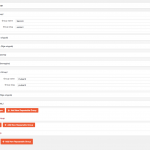Ce fil est résolu. Voici une description du problème et la solution proposée.
Problem: I would like to know how to loop over repeating field groups with PHP.
Solution:
Use the toolset_get_related_posts API. Each RFG can be accessed as a child, where the post is the parent and the relationship slug is the RFG slug.
$parent = get_post( 12345 ); // the parent post that holds the RFG $sezioni = toolset_get_related_posts( $parent, // the parent post 'sezioni', // the RFG slug 'parent', // the post role in this relationship is 'parent' 1000000, // the maximum number of results 0, // the offset array(), // additional query arguments 'post_id', // return format 'child', // role to return ); // $sezioni is now an array of post IDs for each RFG $sez1 = get_post( $sezioni[0] ); // example, get the first Sezioni RFG ID $pulsanti = toolset_get_related_posts( $sez1, // the parent RFG 'pulsanti', // the RFG slug 'parent', // the sezioni role in this relationship is 'parent' 1000000, // the maximum number of results 0, // the offset array(), // additional query arguments 'post_id', // return format 'child', // role to return ); // $pulsanti is now an array of post IDs for each RFG in $sez1
Relevant Documentation:
https://toolset.com/documentation/customizing-sites-using-php/post-relationships-api/#toolset_get_related_posts
This is the technical support forum for Toolset - a suite of plugins for developing WordPress sites without writing PHP.
Everyone can read this forum, but only Toolset clients can post in it. Toolset support works 6 days per week, 19 hours per day.
Aucun de nos assistants n'est disponible aujourd'hui sur le forum Jeu d'outils. Veuillez créer un ticket, et nous nous le traiterons dès notre prochaine connexion. Merci de votre compréhension.
| Sun | Mon | Tue | Wed | Thu | Fri | Sat |
|---|---|---|---|---|---|---|
| 8:00 – 12:00 | 8:00 – 12:00 | 8:00 – 12:00 | 8:00 – 12:00 | 8:00 – 12:00 | - | - |
| 13:00 – 17:00 | 13:00 – 17:00 | 13:00 – 17:00 | 13:00 – 17:00 | 13:00 – 17:00 | - | - |
Supporter timezone: America/New_York (GMT-04:00)
Ce sujet contient 3 réponses, a 2 voix.
Dernière mise à jour par Il y a 6 années et 4 mois.
Assisté par: Christian Cox.
